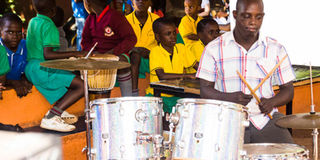Music helping special needs children learn

A special needs child plays drums at Hill Preparatory School in Kampala during a concert at the school recently. Photo by Desire Mbabali
What you need to know:
- Music can be a good tool in teaching and learning in schools but it is more important when given as therapy for children with special needs whose development is slower than normal.
Marvin Kisembo, 13, is one of the students at Hill Preparatory School’s special needs centre, whose life has been transformed by music therapy. As testified by his music teacher and family friend, Dennis Ntale, “It seemed like a joke when he started out. He could not articulate words. He had no rhythm and no concentration at all. Today, he is one of our best pupils when it comes to music,” he says.
Overtime, it has been proven that music therapy is instrumental in educating children with special needs. “In this category, we have children with nodding syndrome, Down syndrome, autism, dyslexia, and general processing disorders.” Betty Akidi, a visiting music therapist at the centre, says. She explains that these disorders affect the child’s memory, growth, teamwork, communication, concentration, among other things.
How it works
“Every child has their unique special needs, and as teachers, our first step is to identify what special care to give them. Moreover, music therapy can be used in the academic learning process, as well as in imparting daily life skills in children,” Florence Nsangi, a special needs teacher at Hill Preparatory School, explains.
Music therapy can be used in every subject. For example in mathematics, you can create a rhythm by clapping from numbers one to number eight, and this can go on for weeks until all the children get it right.
To separate odd numbers from even numbers, a rhythm can also be created by stomping the feet to create loud sound for even numbers and less pronounced sound for odd numbers.
“The learning process becomes both easy and entertaining, but at the same time, children learn to count, communicate, concentrate and work as a team, Akidi explains.
More to that, you can compose songs about topics studied in class as music teacher, Peter Kitumba says. “Pupils learn quicker and faster with rhymes. Sometimes, we deal with children who cannot write. So how do I teach a child without them writing? I resort to music.” Composing interactive and dramatic rhymes on topics such as types of houses, parts of the human body and Bible stories among others has so far been successful in quickening the learning process.
The initiative
Two weeks ago, Hill Preparatory School, Naguru which is one of the primary schools that provide an inclusive environment for children with special needs and regular children hosted students from the Berklee College of Music in Boston MA, to create awareness around the benefits of music therapy and techniques that can be used to enhance learning, cognitive development and alleviate pain.
“The main reason we are here is to see how we can collaborate in implementing music therapy at this school, because it is the fastest way of opening up children with special needs to be able to socialise, communicate, and to see how music therapy can be included in the academic curriculum of the school,” Carol Smith, one of the co-founders of Ubuntu Music Therapy Initiative, mentions.
The music programme was introduced by Jazz saxophonist, Caesar Kajura, in an initiative to bring music therapy to children with special needs at Hill Preparatory School.
This, however, is not exclusive to children with special needs, but brings together regular children in the school as well to have free interactions between the two groups.
Ambrose Lukusa Kibuuka, the school’s head teacher, says sometimes special needs children develop fast and are integrated in classes of regular children. “We have children in the special needs centre that gradually pick up academically and are able to be in the general class.
And we have those with severe situations that need special attention, those learn from the centre though they interact with their fellow pupils in other different activities.”
The centre is home to 60 children with special needs, and a population of about 400 regular pupils, both groups employing music therapy as an academic learning tool, with regular pupils paying Shs430,000, the integrated Shs750,000, and those in the special needs centre Shs970,000. All pupils are in day school.
Music as learning tool
Valuable teaching tool. It makes complex concepts more accessible and enjoyable. It facilitates language learning. Upbeat or uplifting music also may enhance cognitive abilities.
Brain control. Music appears to light up various regions of the brain related to language, hearing and motor control.
Builds character. Music is a great way to engage children in powerful lessons, such as teaching them social and emotional skills. These skills help boost academic performance, improve problem-solving and decision-making, and reduce conduct problems and emotional distress.




